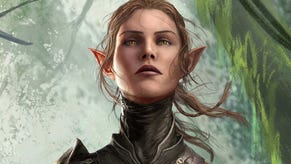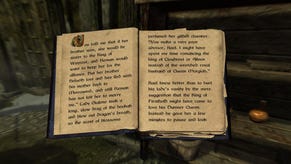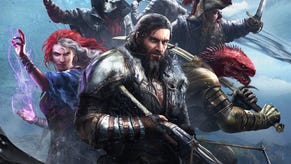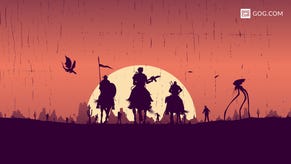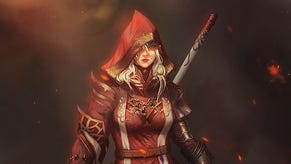Divinity Original Sin 2 Review: Near Godhood
Larian Studios offers a divine CRPG to fans.
This article first appeared on USgamer, a partner publication of VG247. Some content, such as this article, has been migrated to VG247 for posterity after USgamer's closure - but it has not been edited or further vetted by the VG247 team.
I died within my first few minutes of playing Divinity: Original Sin 2. I was being a bit freewheeling, so I dropped into the game's sneak mode and attempted to steal an ancient book. I succeeded, but once I tried to leave the room, the guard said they had to pat me down for contraband. That wasn't going to work–I still had the stolen book on me–so I tried to talk down my jailor.
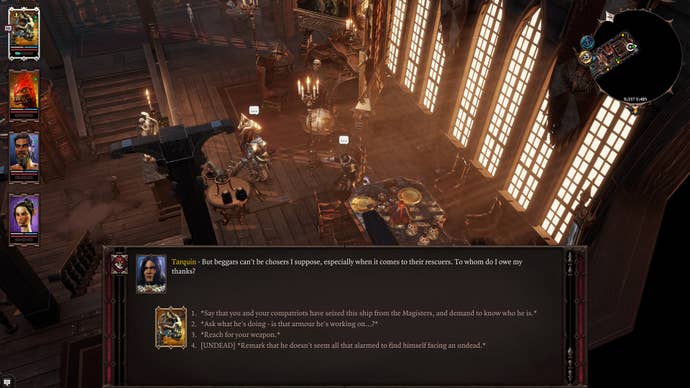
"You're human like me," I casually said. "Surely, you can let me slide on the pat down this one time?" No dice. I was subjected to the pat down and the pilfered tome was found. This threw me into combat with the guards, who had things like armor, weapons, and magic. I didn't last very long. That's the kind of game Divinity: Original Sin 2 is. It is equal parts grand freedom and vicious punishment.
It's a damned amazing game.
Divinity: Original Sin 2 is the latest title from Larian Studios, the studio that has previously produced Divine Divinity, Divinity II: Ego Draconis, and Divinity: Dragon Commander within the same universe. It's the second Kickstarted computer role-playing game (CRPG) from Larian, the first being the rather successful Divinity: Original Sin. If you're a fan of classic CRPGs like Baldur's Gate, Ultima, Planescape: Torment, and Fallout, games like Original Sin have been the vanguard of that style of play in the modern era.
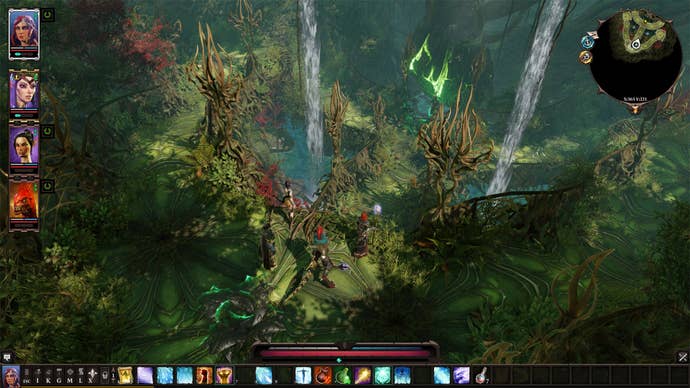
In the game, you play a Sourcerer, a magic user that can tap into the primal Source magic that underpins the world of Divinity. It means you yourself can become Divine, essentially a demi-god in the world of Rivellon. Unfortunately, source magic also calls forth the hungry creatures of the Void. To protect the populace, the ruling Magister sect has gone all Days of Future Past on Sourcerers, rounding them up, putting them in collars that restrict Source access, and shipping them off to the prison isle of Fort Joy.
Being an RPG, Divinity: Original Sin 2 has a decent character creator. I could've used a bit more on the visual end in terms of faces and hairstyles as a human, but the game ultimately gives you five races (human, lizard, dwarf, elf, undead), 14 classes pulling from 10 skill families, and even some odd personalization choices, like which instrument takes the lead in your soundtrack.
On top of that, Larian has added the Tag system. Each character has tags attached to them depending on your choices. The tags determine how the people within the world of Divinity react to you and how you can respond to them. These tags include the basic gender and race markers, and then expand out into aspirational tags, such as whether your character is a Scholar, Jester, or Rogue. There are unlockable tags, like becoming a Hero for doing generally good deeds. It's basically way for the game to give feedback for the character you're supposed to be. It's all in service of the "role-playing" part of RPG.
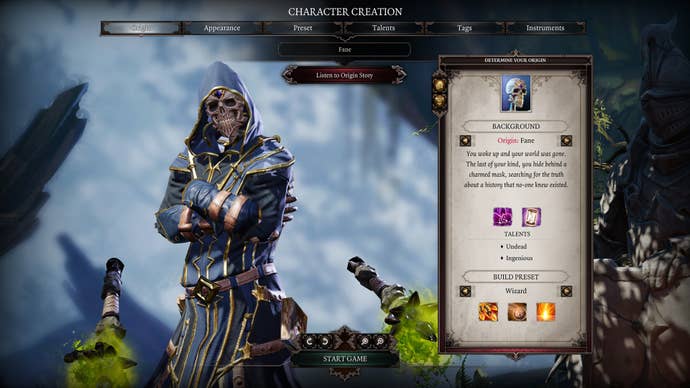
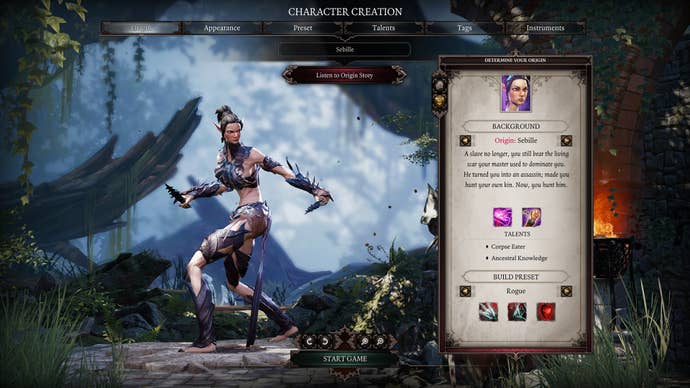
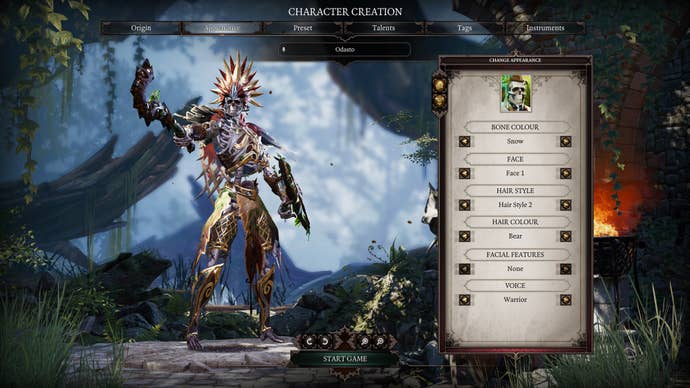
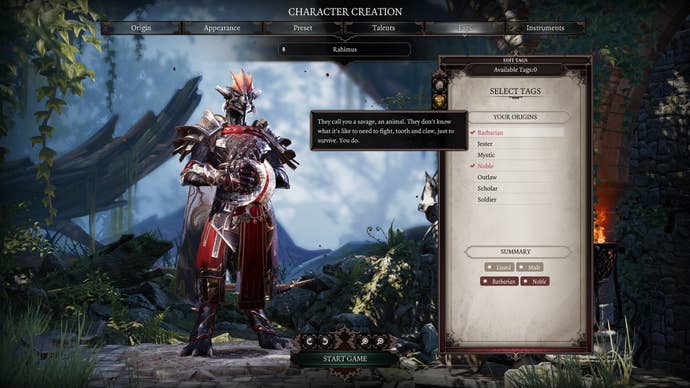
There are additional tags for the pre-created origin characters. There are six in total–Ifan ben-Mezd, Loshe, Red Prince, Beast, Sebille, and Fane–each with their own stated backstory and motivation. I chose Ifan, a mercenary and former soldier who has to do one last job for the Lone Wolves. There's Sebille, the assassin who was sold into slavery and is currently seeking her revenge. My personal favorite is Fane, the undead Eternal, who lives in such grand spans that he doesn't care about the lives of the common man, as he searches the world for information on where his people disappeared to.
Every origin character has additional tags and dialog lines that push them a bit further than the basic custom characters. Sebille has a fiery tongue and conversation options that will get you in trouble more often than not. Lohse is possessed of a sinster secret and certain conversations will see her darker side come out to play. These tags even interact within your party: Sebille was sold as a slave to lizards, so you have to persuade her to join you if the Red Prince is in your party. The origin stories weave in and out of each other and exploring them all is additional spice on top of the main campaign.
Where Divinity: Original Sin 2 steps up to the top of the pack is in the details. Most of your skills can be used in and out of combat, and you have additional talents and special abilities on top of that. What's clear from playing the game is that Larian Studios has just crafted quests with more than a single solution or outcome. They didn't even just offer branches. In many quests, you're given an objective and how you complete that objective is up to you.
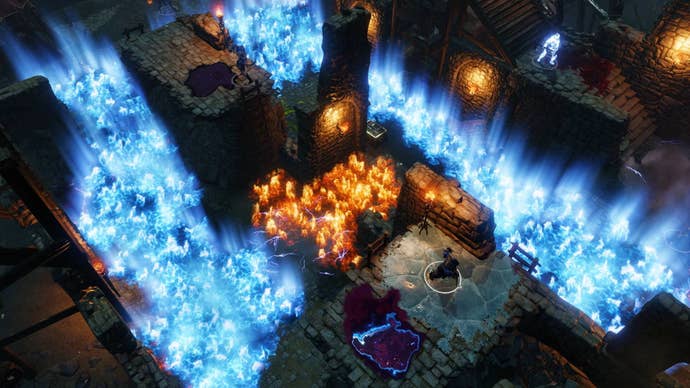
Solving a murder? Perhaps you can pick pocket some evidence, or teleport into a suspect's home to find some good dirt. If you have the Pet Pal talent, maybe you can talk to an animal that saw the crime. If you've gotten far enough to get Spirit Vision, perhaps can have a chat with the murder victim themselves. Elves can actually consume flesh to gain the memories of the fallen. Fane's boney fingers can actually be used as a lock pick! The options are varied and this applies to many of the quests in the game.
As such, the stories are your own. Divinity: Original Sin 2 presents you a starting point and lets you use many of the tools at your disposal to complete your objective. Are there limits here and there that peek their head up? Of course, as the developer can't account for everything. But you always have the feeling that Larian tried to account for the tools you might have in any situation. It allows for water cooler moments, where you ask a friend if they did the same thing you did in a situation. You always feel like you're in on some secret or you're breaking the game in some fashion; it's great that Larian can provide that over the course of an entire game.
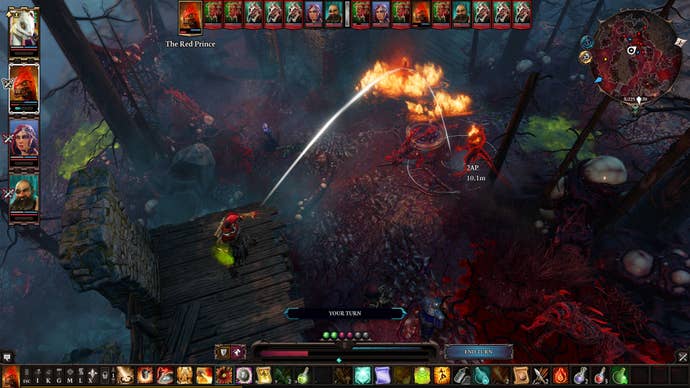
That puzzle-like structure extends to the combat. Divinity: Original Sin 2 is a very systemic game and most of the moment-to-moment play and group composition is about synergizing your tools. If you're fighting foes who are weak against fire, you can summon an oily blob that will attack your enemies. When it dies, it'll cover and area in Oil, which you can then ignite with any fire spell or explosive item. You can cast Decaying Touch on an enemy to give them Decay status (target takes damage from healing), drop a Rain of Blood on them, and then use the Blood Sucker (sucks up blood in the area to heal your target) for big damage. These are pretty simple combos I'm illustrating here and the sky is the limit. Folks have already found infinite combos, like this is some fighting game or something.
Divinity: Original Sin 2 operates on a turn-based combat system, with a Grandia-style action bar showing the who will have the next turn in line. During a character's turn, they have a number of ability points to spend on movement and skills. Combat is about managing your skills and combinations, while also worrying about enemy skill combinations. Worse, worrying about the interactions between your plans, the enemy plans, and the objects lying around the battlefield. You will accidentally kill yourself in Original Sin 2. Bet on it.
Speaking of death, my biggest issue with Divinity: Original Sin 2 is the absolute wall of certain encounters. There isn't always a gradual gradient of difficulty between one encounter and the next. Sometimes you'll coast through, sometimes the enemies will stomp you off. Occasionally, that's because you were supposed to do something else. Perhaps you're just underleveled. Maybe your plan just sucked. It's very XCOM, which I admit might turn off some folks who want to lean harder on the role-playing side of things. (There are four levels of difficulty, with the lowest being Explorer.)
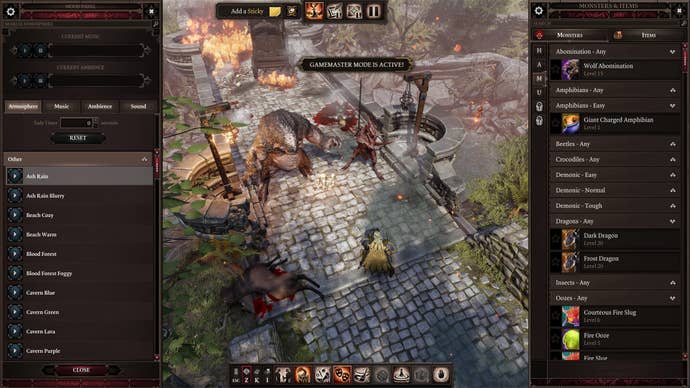
Within just the story campaign, Divinity: Original Sin 2 is a class act. But Larian did not stop there. The entire campaign can be played in local split-screen or online cooperative mode. There's a PVP Arena to get into and try out your spell combos. Used to console play? There's controller support. There's the Game Master mode where one player can create scenarios that other players attempt to beat, with the ability to add monsters and NPCs on the fly. You can download Game Master campaigns and mods from the Steam Workshop.
And none of what I've wrote touches the graphics, which are absolutely beautiful. There are just amazing vistas and amount of detail that Larian put into the environments, including the items strewn about them, is stunning. Or there's the soundtrack, which has a few memorable tracks that you'll notice all the more as you listen for your chosen primary instrument.
It has been a long time since I've played a game that loves the idea of role-playing as much as Divinity: Original Sin 2 does. It's simply an amazing CRPG, not based on nostalgia, but on the concept of allowing the player to do what they want in the world of Rivellon. Original Sin 2 doesn't handhold, but it also doesn't restrict you. There are a few modern games like it, but nothing that has as many options within and without of the game world. For the second time in past few years, I applaud Larian Studios for doing so much with the resources at hand. Divinity: Original Sin 2 has the strongest recommendation I can give.
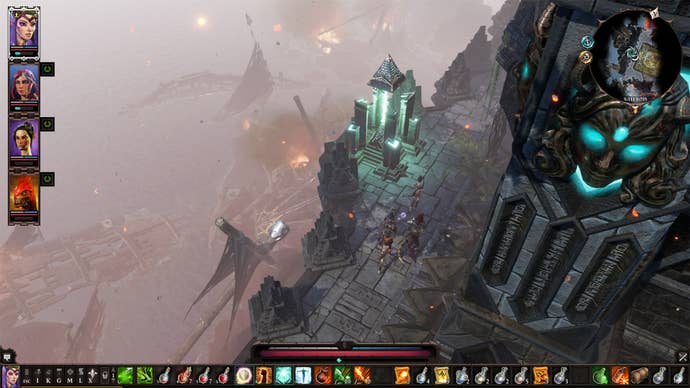
ConclusionDivinity: Original Sin 2 is simply the pinnacle of the CRPG genre. It offers a campaign with memorable characters, interesting role-playing options, and excellent systemic combat. The environments are beautiful and the soundtrack is solid. That alone would put it at the top of the heap, but then Larian added offline and online coop, a PVP arena mode, and Game Master mode, the greatest throwback to the Dungeons & Dragons pen-and-paper games that underpin the entire genre. I might have small issues here and there, but Divinity: Original Sin 2 is one of the best in a strong year for gaming.



